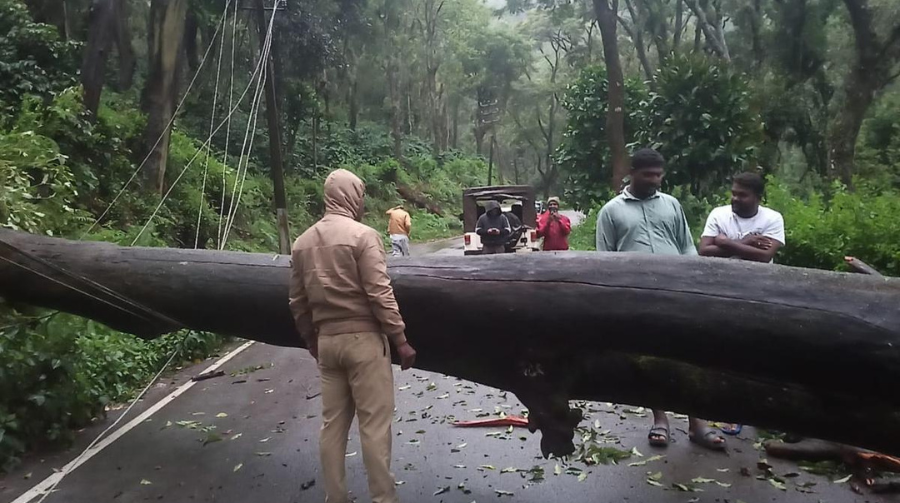News
Kerala on Edge with Red Alert, Maharashtra Soaked as Monsoon Fury Escalates

Kerala Gazes at Extreme Rain
- The India Meteorological Department (IMD) has issued a red alert for five northern Kerala districts—Malappuram, Kozhikode, Wayanad, Kannur, and Kasaragod—due to heavy to extremely heavy rainfall expected from June 14–17, 2025
- An orange alert covers six more districts (Palakkad, Thrissur, Ernakulam, Idukki, Kottayam, Pathanamthitta), while three others are on yellow alert
- Heavy rains have led to:
- Three deaths, two missing in separate incidents
- Mudslides, uprooted trees, flooded lowlands; flood relief camps activated
- Schools & colleges closed in 11 districts from June 15–16
Maharashtra Rains Pick Up Pace
- Southwest monsoon has entered an active phase, delivering intense rainfall across Maharashtra—especially coastal Konkan—over the past 24 hours
- IMD issued red alerts for parts of coastal Maharashtra, Goa, and Karnataka on June 15, forecasting over 20 cm of rain per day in isolated pockets
- Mumbai saw heavy early morning rain, 2–5 AM, causing waterlogging; an orange alert remains active
- Authorities advise farmers to prepare for flooding, and residents to avoid unnecessary travel amid thunderstorm alerts into June 16–18 .
What’s Next?
- Kerala: Rain expected through June 18, fishermen warned against sea travel due to rough seas; relief monitoring continues .
- Maharashtra: Showers likely to persist until June 20, especially in Konkan and Madhya Maharashtra; storms with gusty winds forecast over Marathwada
- Rest of India: Pockets of heavy rain and thunderstorms predicted over Telangana, Karnataka, Andhra Pradesh, Gujarat, and central India .

News
🔥 Thick Smoke Fills Air as Massive Fire Erupts at Dyeing Company in Maharashtra’s Bhiwandi | VIDEO

A massive fire broke out at a dyeing company in Bhiwandi’s Saravali MIDC industrial area early Friday afternoon, sending thick plumes of smoke billowing into the sky and triggering panic among workers and nearby residents.
Fire tenders from Bhiwandi, Thane, and Kalyan fire stations rushed to the spot and are currently engaged in extensive firefighting operations. Fortunately, no casualties or injuries have been reported so far, officials confirmed.
🚒 Fire Details and Current Situation
According to preliminary information from local fire officials, the fire was first reported around 11:15 a.m. from a dyeing and textile manufacturing unit located within the Saravali MIDC (Maharashtra Industrial Development Corporation) estate — an area known for housing several small- and medium-scale textile and chemical units.
Eyewitnesses said they heard a loud noise before noticing dense black smoke rising from the building. The intensity of the flames reportedly spread rapidly due to the presence of flammable chemicals and fabric materials inside the premises.
⚠️ Authorities on High Alert
Local police and disaster management teams have cordoned off the affected area to prevent people from gathering near the site.
Officials from the Thane Municipal Corporation (TMC) and MIDC Fire Department have confirmed that at least six to eight fire tenders are currently working to douse the flames.
Water tankers and firefighting foam units have also been deployed to prevent the fire from spreading to adjacent industrial buildings.
📹 Visuals from the Site
Videos shared by news agency ANI and local reporters show massive flames engulfing the upper portions of the dyeing unit as fire officials attempt to control the situation. The dense smoke cloud could reportedly be seen from several kilometers away, including parts of Kalyan and Thane.
(Watch the viral video below — caution: viewer discretion advised.)
[Embed video placeholder — “Massive fire at dyeing company in Bhiwandi’s Saravali MIDC area. Firefighters on site; no injuries reported so far. (Video: ANI)”]

🧯 Possible Cause of the Fire
While the exact cause of the fire is yet to be determined, initial assessments suggest it may have started due to either:
- A short circuit in the factory’s power line, or
- Overheating of machinery used in the dyeing process.
An official investigation has been launched by the Bhiwandi Fire Department and local police, who will also assess whether fire safety protocols and equipment were in place at the unit.
📍 About Saravali MIDC, Bhiwandi
The Saravali MIDC industrial area, located about 10 km from central Bhiwandi, is a key textile and chemical hub in Thane district. It houses more than 200 small- and medium-scale factories, including dyeing, weaving, and garment units.
Despite repeated incidents of industrial fires in the region over the years, many factories still operate in densely packed structures, raising concerns over fire safety compliance and emergency preparedness.
🗣️ Officials’ Statement
A senior fire officer from Bhiwandi Nizampur Municipal Corporation told India TV Digital:
Local authorities have advised residents to avoid the Saravali MIDC area until operations conclude, as smoke levels remain high.

🧠 Safety Reminder
This incident serves as another reminder of the fire hazards prevalent in industrial zones and the urgent need for regular inspections, safety drills, and installation of automated fire suppression systems.
In the past five years, over a dozen industrial fires have been reported in the Bhiwandi and Thane belt, largely due to electrical faults or chemical mishandling.
📅 Summary: What We Know So Far
| Key Detail | Information |
|---|---|
| Location | Dyeing company, Saravali MIDC, Bhiwandi (Thane district, Maharashtra) |
| Date | November 7, 2025 |
| Time of Incident | Around 11:15 a.m. |
| Cause | Yet to be confirmed (suspected short circuit or machinery fault) |
| Casualties | None reported so far |
| Response Units | 6–8 fire tenders from Bhiwandi, Thane, and Kalyan |
| Current Status | Fire under control; cooling operations ongoing |
| Source of Visuals | ANI, local witnesses |
Politics
India, China Hold ‘In-Depth’ Talks on Western Border Management Amid Renewed Diplomatic Efforts

In a significant diplomatic development, India and China have once again held fresh talks aimed at improving control and management along the western section of their disputed border, signaling renewed efforts by both Asian giants to stabilize bilateral relations after years of heightened tension.
According to a statement released by the Chinese Defence Ministry, the two sides conducted “active and in-depth communication” on border management mechanisms, particularly focusing on reducing frictions and enhancing mutual trust between frontline military personnel.
An official response from India’s Ministry of External Affairs (MEA) is expected soon.
🏔️ Background: A Decade of Tension Along the Line of Actual Control (LAC)
The talks mark another step in the long process of managing tensions along the Line of Actual Control (LAC) — a de facto boundary stretching over 3,400 kilometers that divides Indian and Chinese-held territories.
Relations between the two nations hit a severe low following the Galwan Valley clash in June 2020, which resulted in the first combat fatalities on the border in over four decades. The incident led to deep diplomatic mistrust and a sharp military buildup on both sides of the LAC in Ladakh’s western sector.
Despite 20 rounds of Corps Commander-level talks and multiple Working Mechanism for Consultation and Coordination (WMCC) meetings, complete disengagement has not yet been achieved in several friction points, including Depsang Plains and Demchok.
However, in recent months, both countries have shown measured diplomatic flexibility aimed at preventing further escalation.

🤝 Latest Meeting: A Move Toward De-escalation
While specific details of the latest discussion remain undisclosed, officials familiar with the matter suggest that the focus was on improving border management and establishing new communication protocols between military commands.
Sources also indicated that the discussions might have included measures to prevent accidental face-offs, such as:
- Enhancing hotline communication between border outposts.
- Reviewing patrolling patterns in contested zones.
- Exploring the creation of buffer zones similar to those established in Pangong and Gogra areas earlier.
The timing of the meeting — just weeks after renewed bilateral air links and PM Modi’s SCO visit to China — underscores both governments’ intent to gradually normalise relations.
✈️ Signs of Thaw: Flights, Summits, and Symbolic Gestures
Earlier this week, IndiGo Airlines became the first Indian carrier to resume direct flights between India and China post-pandemic, operating the Kolkata–Guangzhou route. The Chinese Embassy in New Delhi hailed this move as a “major milestone in restoring people-to-people exchanges.”
The resumption of air connectivity follows incremental diplomatic engagements, including:
- High-level meetings at multilateral platforms such as the BRICS and SCO summits.
- Resumption of trade delegations in the pharmaceutical and tech sectors.
- Ongoing student and business visa relaxations between the two countries.
🏛️ PM Modi and President Xi Jinping’s Meeting at SCO Summit
During the SCO Summit 2025 in Tianjin, Prime Minister Narendra Modi and Chinese President Xi Jinping held a bilateral meeting for the first time in several years. The two leaders reaffirmed their countries’ commitment to maintaining peace along the border and strengthening economic cooperation.
President Xi described the two nations as the “dragon and elephant” that must “dance together for Asia’s stability and development.”
PM Modi, in turn, emphasized the importance of “mutual respect, mutual sensitivity, and mutual interests” as guiding principles for rebuilding trust.
Diplomatic analysts viewed the meeting as a symbolic reset, setting the stage for structured dialogue and possible de-escalation in border management.
🌏 Geopolitical Significance: A Pragmatic Shift
Experts believe these recent engagements reflect a pragmatic recalibration by both nations, driven by global economic headwinds, energy security challenges, and regional power balancing amid ongoing US–China rivalry.
🔍 Looking Ahead: Gradual Normalization or Strategic Pause?
While the latest talks mark a positive development, experts caution that deep mistrust remains.
Both sides continue to fortify border infrastructure and deploy advanced surveillance assets along the LAC, indicating that peace remains fragile.
However, analysts also note that regular dialogue, combined with confidence-building measures, could pave the way for a long-term border management framework, reducing the likelihood of future confrontations.
📅 Summary: Key Takeaways from the India–China Talks
| Category | Details |
|---|---|
| Meeting Focus | Border management and western sector control |
| Location | Likely via military channels in China’s western command region |
| Chinese Statement | “Active and in-depth communication held” |
| Indian Response | Awaited from MEA |
| Backdrop | Post-Galwan Valley tensions and gradual diplomatic thaw |
| Recent Development | Resumption of India–China flights (Kolkata–Guangzhou) |
| Leadership Meeting | Modi–Xi at SCO 2025 Summit, Tianjin |
| Outlook | Gradual normalization, continued dialogue |
News
🌪️ Cyclone Montha: Evacuations Underway as Andhra Pradesh, Odisha Brace for Landfall Today | Top Updates

The India Meteorological Department (IMD) has issued an orange alert for parts of Andhra Pradesh and Odisha, as Cyclone Montha intensifies into a severe cyclonic storm over the west-central Bay of Bengal. The cyclone is expected to make landfall between Machilipatnam and Kalingapatnam, near Kakinada, on the evening of Tuesday, October 28, 2025.
⚠️ Current Situation and IMD Forecast
According to the IMD’s latest bulletin, Cyclone Montha was located approximately:
- 280 km south-southeast of Machilipatnam,
- 360 km south-southeast of Kakinada,
- 410 km south of Visakhapatnam, and
- 610 km south-southwest of Gopalpur (Odisha).
The system is moving north-northwestwards at 15 km/h and is likely to intensify further into a severe cyclonic storm by Tuesday morning.
At the time of reporting, the cyclone’s maximum sustained wind speed was around 80–90 km/h, gusting up to 100 km/h, and is expected to strengthen to 90–100 km/h, gusting up to 110 km/h, before landfall.
IMD has forecast heavy to very heavy rainfall in parts of coastal Andhra Pradesh and south Odisha, accompanied by lightning, thunder, and gusty winds from October 28–30.

🌊 Sea Conditions: High Wave Alerts
The Indian National Centre for Ocean Information Services (INCOIS) has issued a warning about rough sea conditions along the Andhra Pradesh coastline, particularly from Nellore to Srikakulam, with wave heights between 2 and 4.7 metres expected between 5:30 pm and 11:30 pm on October 27.
Authorities have strictly prohibited fishermen from venturing into the sea, while coastal tourism and beach activities have been suspended in Vishakhapatnam, Kakinada, and nearby regions.
Ports have been instructed to hoist the Distant Warning Signal-II, signaling a developing storm condition.
🏠 Evacuation and Disaster Preparedness
In anticipation of landfall, the Odisha government has placed eight southern districts under “red alert”, initiating large-scale evacuations from low-lying and coastal villages.
According to Odisha Revenue and Disaster Management Minister Suresh Pujari, the state has deployed 140 rescue teams, including personnel from:
- National Disaster Response Force (NDRF)
- Odisha Disaster Rapid Action Force (ODRAF)
- Fire and Emergency Services
Similarly, Andhra Pradesh Chief Minister Y. S. Jagan Mohan Reddy has directed district collectors to ensure zero casualties, with control rooms operating round-the-clock. Over 200,000 residents in vulnerable areas are being shifted to relief camps across East and West Godavari, Krishna, and Srikakulam districts.
The Centre has also deployed 22 NDRF teams across five states — Andhra Pradesh, Odisha, Puducherry, Tamil Nadu, and Chhattisgarh — for emergency response operations.

🌧️ Likely Impact Zones and Weather Alerts
The IMD predicts widespread rainfall across the following areas:
- Andhra Pradesh: East & West Godavari, Krishna, Guntur, Visakhapatnam, Srikakulam
- Odisha: Ganjam, Gajapati, Rayagada, and Koraput districts
- Tamil Nadu & Puducherry: Light to moderate rain with isolated heavy rainfall
- Chhattisgarh: Isolated heavy spells likely as the storm weakens inland
Flooding, uprooting of trees, and disruption in road and rail transport are anticipated in affected districts.
🌀 Cyclone Montha: Name and Origin
The name “Montha”, meaning a fragrant flower in Thai, was proposed by Thailand as part of the World Meteorological Organization’s naming system for tropical cyclones in the North Indian Ocean.
This is the sixth cyclone of the 2025 season in the Bay of Bengal and comes shortly after Cyclone Faniya, which struck the Myanmar coast earlier in September.
Meteorologists have noted that unusually warm sea surface temperatures (29–30°C) in the Bay of Bengal are fueling rapid intensification, a trend increasingly linked to climate change and El Niño conditions in the Pacific.

🚨 Government Advisories and Safety Measures
- Residents in coastal and low-lying areas are advised to stay indoors and avoid unnecessary travel.
- Fishermen have been instructed not to venture into the sea until further notice.
- Power and communication lines are being reinforced in coastal belts.
- The Indian Navy and Coast Guard have deployed ships and aircraft for surveillance and emergency rescue.
- Relief materials, including food, tarpaulins, and first aid, have been pre-positioned in district warehouses.
🗺️ Cyclone Montha Path Prediction
As per the latest IMD model projections:
- The cyclone will move north-northwestwards, crossing the Andhra Pradesh coast near Kakinada by late evening of October 28.
- Post landfall, it will gradually weaken into a cyclonic storm, moving towards southern Chhattisgarh and eastern Maharashtra by October 30.
🌧️ Expected Timeline (October 27–30)
| Date | Expected Impact | Areas |
|---|---|---|
| Oct 27 (Night) | High waves, rough seas | Nellore to Srikakulam (AP Coast) |
| Oct 28 (Morning–Evening) | Severe cyclonic storm, heavy rain | Machilipatnam–Kakinada belt |
| Oct 29 | Rain, flooding, gusty winds | Odisha, North Andhra, Chhattisgarh |
| Oct 30 | Weakening phase, scattered rainfall | Telangana, Vidarbha, Odisha plains |

🛰️ Monitoring and Forecasting Support
The IMD, INCOIS, and the Regional Specialized Meteorological Centre (RSMC), New Delhi, are providing real-time tracking using:
- INSAT-3D and INSAT-3DR satellite imagery
- Ocean buoy data and Doppler Weather Radars
- Automated cyclone tracking models (GFS, ECMWF, and IMD-GEFS ensembles)
Officials have assured that hourly updates will be shared through All India Radio, Doordarshan, and local news networks.
📰 Summary: Cyclone Montha — Key Points
- Landfall timing: Evening/night of October 28, near Kakinada
- Wind speed: 90–100 km/h, gusting to 110 km/h
- States on alert: Andhra Pradesh, Odisha, Tamil Nadu, Puducherry, Chhattisgarh
- NDRF teams deployed: 22
- Villages likely affected: 1,419; towns: 44
- Sea waves: Up to 4.7 metres (INCOIS warning)
- Next update: IMD bulletin at 10:30 am IST, October 28
-

 Celebrity Lifestyle6 months ago
Celebrity Lifestyle6 months agoEx-Cricketer Shikhar Dhawan Buys Ultra-Luxury Apartment Worth ₹69 Crore in Gurugram
-

 Glamour & Entertainment5 months ago
Glamour & Entertainment5 months agoTelegram Channels Disseminating Pro‑Russian Propaganda in Poland
-

 Crime & Investigation3 months ago
Crime & Investigation3 months agoDelhi Police SI Neetu Bisht Caught Taking ₹20 Lakh Bribe – Shocking Details Emerge in Corruption Probe
-

 Business5 months ago
Business5 months agoAmazon sets 30‑day relocation deadline for corporate staff—opt out by resigning in 60 days
-

 Celebrity Lifestyle5 months ago
Celebrity Lifestyle5 months agoMaha Kumbh Girl Monalisa seen in car allegedly worth ₹1 crore
-

 Entertainment5 months ago
Entertainment5 months agoAbhijeet & Dr Tarika Reunite in CID 2 — Fans Say ‘Clear the Misunderstanding Now
-

 Education5 months ago
Education5 months agoNEET UG Controversy Explained: Paper Leak, Impersonations & Ongoing Probe
-

 Bollywood3 months ago
Bollywood3 months agoNo ₹3 Lakh Fine or 2-Year Jail: The Truth Behind the ‘Hakla’ GIF Buzz










